

What Is the Bystander Effect? What Is the Bystander Effect? If you witnessed an emergency happening right before your eyes, you would certainly take some sort of action to help the person in trouble, right?
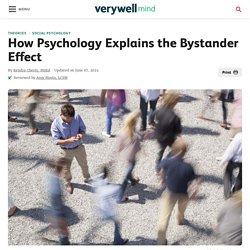
Toddler incident in China shows 'volunteer's dilemma'. A security camera video of a toddler being run over twice on a street in China has swept across the Web in recent days and has drawn a chorus of horrified denunciations.
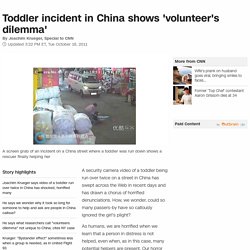
How, we wonder, could so many passers-by have so callously ignored the girl's plight? As humans, we are horrified when we learn that a person in distress is not helped, even when, as in this case, many potential helpers are present. Our horror increases if the person is victimized in a particularly vicious or careless way by fellow human beings. Our horror is further heightened when we learn that the victim is helpless and the kind of person who normally stimulates our instinct to aid and protect. Our spontaneous reaction is to say: "Had I been there, I would have helped; what is wrong with these people? " It is true that cultural differences exist in many aspects of human behavior, and many of these differences are not trivial.
Examples of the Bystander Effect - Owlcation - Education. Just Admit It, You've Done It Have you ever driven by a car accident?
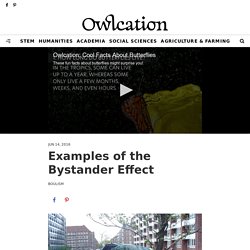
Did you stop? Did you call the police? Chances are, despite the fact that you won’t admit it to others, you know the answer is yes. Don’t worry, you are not alone. Kitty Genovese On March 13, 1964, a twenty-eight year old woman named Kitty Genovese was walking to her apartment after a long night of managing the bar she worked for. THE BYSTANDER EFFECT.
The bystander effect is being made worse by people filming violent events on their smartphones. On April 9, 2017, a video of a man being dragged off a United Airlines flight was posted on the internet and went viral.
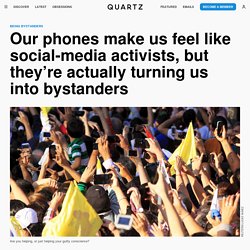
But I don’t need to tell you that. Each of your most outspoken Facebook friends probably posted about the event, highlighting the aspects of it that best reinforced their worldview. The incident was covered all over American media and even sparked outrage in China. The collective focus may have now moved on to its next source of outrage, but there was something that only a few people noticed in the moment: a plane full of quiet passengers. Other than one woman screaming, hardly anyone else on the plane seemed bothered enough by what was happening to raise a ruckus. Instead of intervening in the assault, the passengers stoically took out their cameraphones and pointed them toward David Dao, whose body was dragged along the aisle of the airplane, glasses askew, face bloody, and belly exposed. Why we still look away: Kitty Genovese, James Bulger and the bystander effect. More than half a century later, the death of Kitty Genovese continues to remind us of the disconnect between what we believe about ourselves and how we really act under pressure.
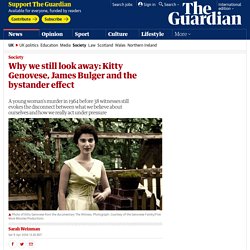
The murder of the 28-year-old outside her apartment in the Queens neighborhood of Kew Gardens in the early morning of 13 March 1964 rippled through New York City and around the world. How could a young, independent woman who lived on her own terms be so easily struck down? How could so many neighbors look on and turn away as she was stabbed repeatedly on the street and in her apartment building? What did that collective inability to act reveal about ourselves, our communities, and our belief systems? Genovese’s killer, Winston Moseley, died in prison this week, bringing the case and its implications back into the spotlight. Two weeks after her murder, Rosenthal assigned a story with the damning headline: “Thirty-Seven Who Saw Murder Didn’t Call Police.” Bystander inaction, like 7-Eleven assault, more likely with more witnesses, experts say - Chicago Tribune.
New York Today: The City’s Bystander Effect. Good morning on this clear Monday.
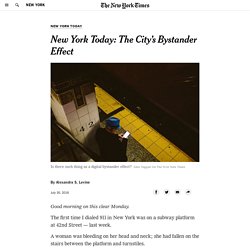
The first time I dialed 911 in New York was on a subway platform at 42nd Street — last week. A woman was bleeding on her head and neck; she had fallen on the stairs between the platform and turnstiles. Some passengers hurried past her. Others stopped to look and moved on. Several took out their phones — not to call for help, but instead to record the scene. Maybe you’ve witnessed a similar episode in the city:curious onlookers who hesitate to act, or opt not to do anything at all. It’s often what psychologists call “the bystander effect.” “It’s a general term for people not reacting, when they’re in a group, to some sort of situation that might call for a reaction — where responsible intervention would be the right call, but no one is intervening,” said Katherine Fox-Glassman, a lecturer in the department of psychology at Columbia University, whose research has focused on judgment, decision-making and risk perception.
What are some sad examples of the bystander effect in real life? Reducing the Bystander Effect. As discussed, there are a number of factors that magnify the Bystander Effect.
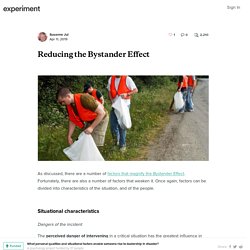
Fortunately, there are also a number of factors that weaken it. Once again, factors can be divided into characteristics of the situation, and of the people. Situational characteristics. How to Break the Bystander Effect. They could have left it to someone else. An Army veteran blocked a shooter in Oregon from entering his classroom. Three friends on a high-speed train from Paris to Amsterdam helped stop a gunman wielding an AK-47. This past spring, an Army captain in North Carolina pulled a couple to safety after a fiery car crash. Were these men instinctively courageous, or had they learned to be?
The Army captain (aptly wearing a Captain America T-shirt) credited his military training for knowing what to do and remaining calm. These heroes are dramatic examples. And this conundrum is not limited to thwarting terrorism or physically saving someone. 5 Effective Tips to Overcome the Bystander Effect. Do you know about the bystander effect?
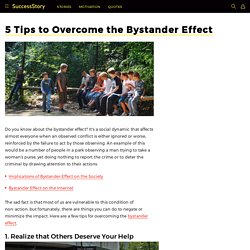
It's a social dynamic that affects almost everyone when an observed conflict is either ignored or worse, reinforced by the failure to act by those observing. Psychology of the Bystander and tips for increasing chances of receiving help - Fight Times Magazine. Will I intervene?

Bystanders must weigh the costs or dangers of intervening. Will I be harmed? Will I be sued? People are often concerned about getting in trouble if something goes wrong while helping (liability issues). Let's start with examining each question closely and finding possible ways to maximize a positive outcome. How To Counteract The Bystander Effect - University of Pittsburgh Student EMS. Counteracting The Bystander Effect It is a beautiful spring day in Oakland.

There are just a few weeks left until summer break and everyone is ready to go home. You are in Cathy studying and you see that the person a few tables over seems to be passed out. You notice they haven't moved in hours. Hundreds of people have walked by and seem to take notice but no one has done anything. Return To PITTect Your Friends HomePage Create your own unique website with customizable templates. Get Started. Positive bystander behavior. BYSTANDER INTERVENTION.